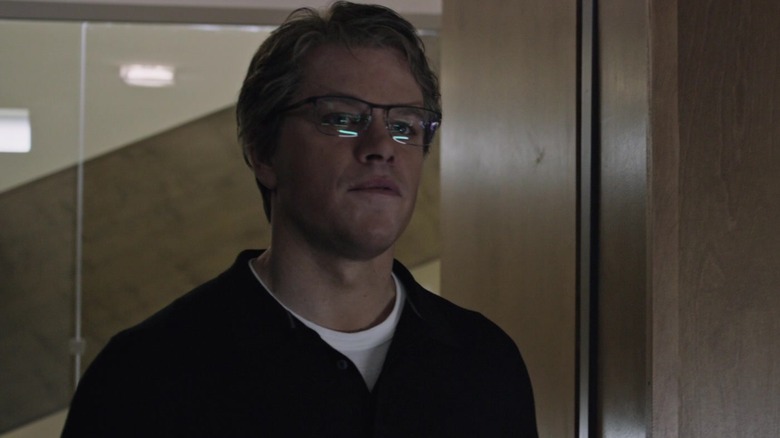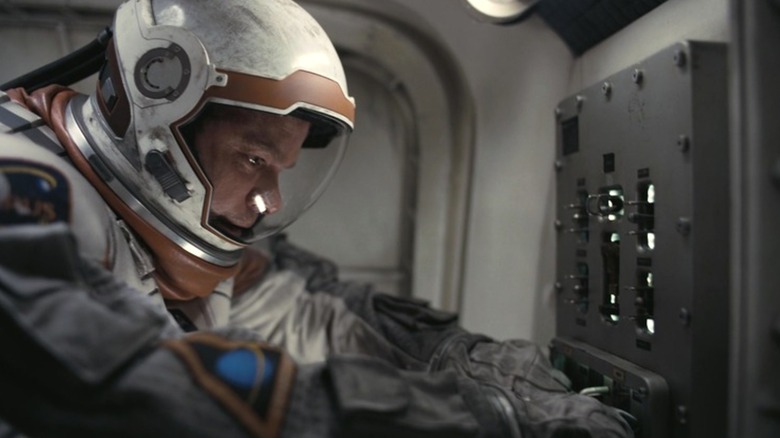Interstellar Almost Stopped Matt Damon From Doing This Hit Movie With 91% On Rotten Tomatoes
The narrative heft of "Interstellar" lies in the desperate search for a habitable planet while the atmosphere on Earth becomes increasingly unlivable. During this search, we visit the icy planet endorsed by Dr. Mann (Matt Damon), who is woken up from decades of cryostasis by Cooper (Matthew McConaughey) and his crew. While Mann's reports about the planet's suitability for human survival initially evoke hope, the ugly reality of the situation reveals itself after Mann tries to kill Cooper and boards the crew's spacecraft.
This pivotal sequence etches an uncomfortably stark picture of betrayal, underlining the human tendency to abandon base empathy in a desperate (and selfish) urge to survive. Damon's cameo, although brief, makes a memorable mark on the evolving story, as Mann's cowardice and betrayal induce a bleak scenario that only pushes Cooper and Dr. Brand (Anne Hathaway) to pull off the impossible.
A year later, Damon assumed a similar role in Ridley Scott's "The Martian," an epic science fiction adventure that also tests the limits of human grit and perseverance. Like Mann, Dr. Mark Watney (Damon) is also stranded on a near-inhospitable planet, on which he must find a way to communicate with NASA and return home before it's too late. The comparisons between the roles are inevitable, and Damon himself was initially hesitant to play Watney right after embodying the villainous Mann in "Interstellar," but Scott dismissed his concerns by emphasizing that the movies were "totally f***ing different." Damon told Yahoo! about his first meeting with Scott, and how the acclaimed director had eased his worries right away:
"I went in to meet him [Scott], then I signed on really quickly. I went in and I said, I really love this script, but my only hesitation is I've just done 'Interstellar', in which I played a dude stranded on a planet. It might be weird if, after taking a year and a half off, I played another dude stranded on a planet. I explained 'Interstellar' to him, and he said, 'The movies are totally f***ing different, this is going to be f***ing fun. Let's do this!' He was so infectious, I couldn't really say no to him."
Scott isn't wrong about the roles being completely different, as Mark Watney can be perceived as the antithesis of Dr. Mann and everything he stands for. Let's examine these differences.
The Martian's Mark Watney is everything Interstellar's Dr. Mann can never be
In "Interstellar," Cooper and Brand are a little too late to realize that Dr. Mann's data about his chosen planet is fabricated, as the latter had come to terms with the futility of his plans years ago. Mann's estimations about the icy planet turned out to be incorrect the moment he landed on the surface, but he sent out a signal in hopes of being rescued. Duplicity seems embedded in Mann's personality from the get-go, as he has no qualms about killing the same people who saved his life and provided him with emotional comfort. While Mann's initial actions are understandable, his subsequent plan to kill everyone and escape with the craft paints him as morally irredeemable. Mann meets a grisly end while attempting to dock the craft manually, and honestly? It's absolutely deserved.
On the flip side, Watney's stranding on Mars in "The Martian" is an unfortunate accident, as his crew assumes that he didn't survive the falling debris during the sandstorm. Watney immediately reasons that he must "science the sh*t out of this" if he wants to survive, and begins to document his journey while working on a way to communicate with NASA. Watney has every reason to despair or believe that no one will come back for him, but his optimism extends to that of his fellow humans, as he ardently believes in human compassion. Of course, this journey is neither easy nor devoid of major obstacles, but Watney maintains his stance that the human instinct to rescue someone who is left behind cannot be ignored.
In contrast, Mann glorifies the survival instinct without considering the survival of those around him, putting his faith in selfishness over empathy or compassion. "We can care deeply — selflessly — about those we know, but that empathy rarely extends beyond our line of sight," Mann lectures Cooper, as he projects his lack of compassion onto the crew, believing that anyone would've done the same.
Also, Watney's belief in the human ability to achieve the impossible isn't a baseless daydream, as he embodies this quality throughout his journey and does everything he can to meet this ideal. He also believes that his crew members share this ideal — and he is proven right, as evidenced by one of the most life-affirming rescue mission sequences put to film.

